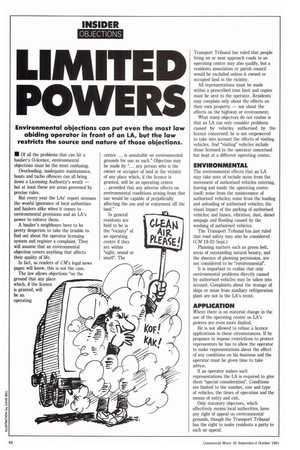LIMITED POWERS
Page 44

If you've noticed an error in this article please click here to report it so we can fix it.
Environmental objections can put even the most law abiding operator in front of an LA, but the law restricts the source and nature of those objections.
• Of all the problems that can hit a haulier's 0-licence, environmental objections must be the most confusing.
Overloading, inadequate maintenance, hours and tacho offences can all bring down a Licensing Authority's wrath — but at least these are areas governed by precise rules.
But every year the LAs' report stresses the woeful ignorance of local authorities and haulers alike when it comes to environmental provisions and an LA's power to enforce them.
A haulier's neighbours have to be pretty desperate to take the trouble to find out about the operator licensing system and register a complaint. They will assume that an environmental objection covers anything that affects their quality of life.
In fact, as readers of CM's legal news pages will know, this is not the case.
The law allows objections "on the ground that any place
which, if the licence is granted, will be an operating
centre ... is unsuitable on environmental grounds for use as such." Objection may be made by "... any person who is the owner or occupier of land in the vicinity of any place which, if the licence is granted, will be an operating centre ...provided that any adverse effects on environmental conditions arising from that use would be capable of prejudicially affecting the use and or enjoyment off the land."
In general residents are held to be in the 'vicinity" of an operating centre if they are within "sight, sound or smell". The Transport Tribunal has ruled that people living on or near approach roads to an operating centre may also qualify, but a residents association or parish council would be excluded unless it owned or occupied land in the vicinity.
All representations must be made within a prescribed time limit and copies must be sent to the operator. Residents may complain only about the effects on their own property — not about the effects on the highway or environment.
What many objectors do not realise is that an LA can only consider problems caused by vehicles authorised by the licence concerned: he is not empowered to take into account the effects of visiting vehicles. And "visiting" vehicles include those licensed to the operator concerned but kept at a different operating centre.
ENVIRONMENTAL
The environmental effects that an LA may take note of include noise from the movement of authorised vehicles entering, leaving and inside the operating centre itself; noise from the maintenance of authorised vehicles; noise from the loading and unloading of authorised vehicles; the visual impact of the parking of authorised vehicles; and fumes, vibration, dust, diesel seepage and flooding caused by the washing of authorised vehicles.
The Transport Tribunal has just ruled that road safety may also be considered (CM 19-25 Sept.) Planning matters such as green belt, areas of outstanding natural beauty, and the absence of planning permission, are not considered to be "environmental".
It is important to realise that only environmental problems directly caused by authorised vehicles may be taken into account. Complaints about the storage of skips or noise from auxiliary refrigeration plant are not in the LA's remit.
APPLICATION Where there is no material change in the use of the operating centre an LA's powers are even more limited.
He is not allowed to refuse a licence applicatiuon in these circumstances. If he proposes to impose restrictions to protect representors he has to allow the operator to make representations about the effect of any conditions on his business and the operator must be given time to take advice.
If an operator makes such
representations the LA is required to give them "special consideration". Conditions are limited to the number, size and type of vehicles, the times of operation and the means of entry and exit.
Only statutory objectors, which effectively means local authorities, have any right of appeal on environmental grounds, though the Transport Tribunal has the right to make residents a party to such an appeal.




































































































